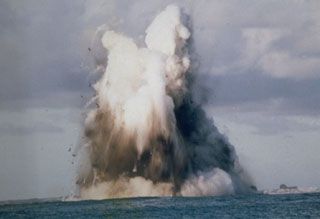Report on Nishinoshima (Japan) — 1 July-7 July 2020
Smithsonian Institution / US Geological Survey
Weekly Volcanic Activity Report, 1 July-7 July 2020
Managing Editor: Sally Sennert.
Please cite this report as:
Global Volcanism Program, 2020. Report on Nishinoshima (Japan) (Sennert, S, ed.). Weekly Volcanic Activity Report, 1 July-7 July 2020. Smithsonian Institution and US Geological Survey.
Nishinoshima
Japan
27.247°N, 140.874°E; summit elev. 100 m
All times are local (unless otherwise noted)
JMA reported that the eruption at Nishinoshima had been particularly vigorous since mid-June, producing a large amount of ash. Based on satellite data, the Tokyo VAAC reported that during 1-3 and 5-7 July ash plumes rose to 2.7-4.9 km (9,000-16,000 ft) a.s.l. and drifted N and NW, and sometimes SW. On 4 July, ash plumes rose to 8.3 km above the summit (or to 24,000-28,000 ft. a.s.l.), the highest recorded plume since the volcano became active in 2013.
Geological Summary. The small island of Nishinoshima was enlarged when several new islands coalesced during an eruption in 1973-74. Multiple eruptions that began in 2013 completely covered the previous exposed surface and continued to enlarge the island. The island is the summit of a massive submarine volcano that has prominent peaks to the S, W, and NE. The summit of the southern cone rises to within 214 m of the ocean surface 9 km SSE.
Sources: Japan Meteorological Agency (JMA), Tokyo Volcanic Ash Advisory Center (VAAC)

